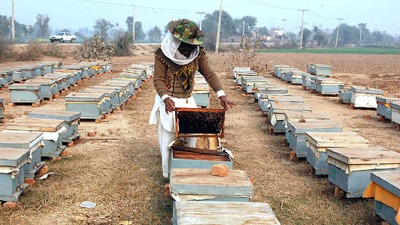ISLAMABAD: The honey industry of Pakistan has enormous potential to generate a wealth of economic benefits; however, a number of issues have limited its development. To increase production and export of this natural sweetener, a well-organized value chain is required, reports WealthPK.
Pleading anonymity because he was not authorized to speak, an expert from the National Agricultural Research Council (NARC) and Honeybee Research Institute (HBRI) told WealthPK that beekeeping and honey production has enormous potential to generate a wide range of economic benefits in Pakistan, but unluckily this industry has not got the required attention due to a number of factors, including pesticide damage, lack of application of modern technology, insufficient compliance with the international standards and certifications, and weak branding and marketing.”
“There are four species of honeybees in Pakistan out of which three are native to the country and one is from the West. ApisMellifera is a western species, while ApisDorsata, ApisCerana, and ApisFlorea are found across the country in a range of biological zones. ApisMellifera is already being grown in contemporary hives by about 7,000 beekeepers,” he said.
“The country’s pleasant environment and bee flora provide an ideal potential for the expansion of the beekeeping business. Beehive flora can support over 1,000,000 honeybee colonies and can be found in all provinces, including Northern regions, FATA, and AJK,” said the NARC official.
“Prior to the recently announced ‘Billion Tree Honey Initiative’, the honey value-chain had often been ignored by lawmakers. Through this program, the government hopes to boost honey production from the current 15,000 tonnes per year to 70,000 tonnes annually,’’ the expert said, adding that 80,000 new jobs, and PKR50 billion could be generated through the honey value chain.
As the commercial beekeeping industry is booming, more people are turning to self-employment to increase their income, he said, adding that honey production is planned in areas with numerous agricultural farms and wild plantings.
“Chakwal, Mianwali, Attock, Sargodha, and Daska in the Punjab province are excellent locations for honey bee cultivation, while Karak, Kohat, Swat, Bannu, and Chitral in Khyber Pakhtunkhwa province are the best. A few locations in Sindh, including Thatta, Sujawal, Mirpurkhas, Hyderabad, and Gularchi, are suitable for producing honey, according to experts,” he said.
It is important to ensure the availability of high-quality honey from beekeepers and an acceptable retail price for the local customers in order to expand commercially in the domestic market. To increase the export of honey from Pakistan to high-value countries, it is also essential to build accredited quality testing facilities to prevent adulteration and to strengthen branding and marketing to improve the product value. Currently, Pakistan only exports honey to Middle Eastern nations, where it is a low-value good.





